Related Research Articles
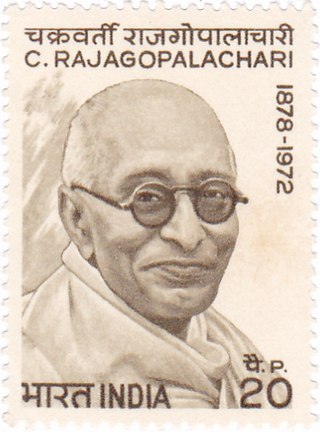
Chakravarti Rajagopalachari, popularly known as Rajaji or C.R., also known as Mootharignar Rajaji, was an Indian statesman, writer, lawyer, and independence activist. Rajagopalachari was the last Governor-General of India, as India became a republic in 1950. He was also the first Indian-born Governor-General, as all previous holders of the post were British nationals. He also served as leader of the Indian National Congress, Premier of the Madras Presidency, Governor of West Bengal, Minister for Home Affairs of the Indian Union and Chief Minister of Madras state. Rajagopalachari founded the Swatantra Party and was one of the first recipients of India's highest civilian award, the Bharat Ratna. He vehemently opposed the use of nuclear weapons and was a proponent of world peace and disarmament. During his lifetime, he also acquired the nickname 'Mango of Salem'.
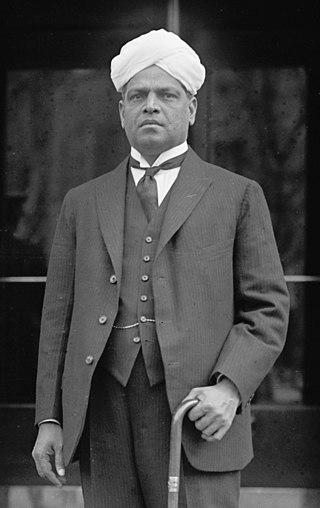
Valangaiman Sankaranarayana Srinivasa Sastri was an Indian politician, administrator, educator, orator and Indian independence activist. He was acclaimed for his oratory and command over the English language. Srinivasa Sastri was born to a poor temple priest in the village of Valangaiman near Kumbakonam, India. He completed his education at Kumbakonam and worked as a school teacher and later, headmaster in Triplicane, Madras. He entered politics in 1905 when he joined the Servants of India Society. Sastri served as a member of the Indian National Congress from 1908 to 1922, but later resigned in protest against the Non-Cooperation movement. Sastri was one of the founding members of the Indian Liberal Party. In his later days, he was strongly opposed to the partition of India.

Paramasiva Subbarayan was an Indian politician, freedom fighter and diplomat and was the Chief Minister of Madras Presidency, India's ambassador to Indonesia and Union Minister of Transport and Communications in Jawaharlal Nehru's government. He was the father of General P. P. Kumaramangalam who served as India's Chief of Army staff and politician Mohan Kumaramangalam. He was also the grandfather of INC and BJP politician and Union Minister Rangarajan Kumaramangalam.
Raja Sri Ravu SvetachalapatiSir Ramakrishna Ranga RaoKCIE was an Indian politician and zamindar who served as the Chief Minister of Madras Presidency from 5 November 1932 to 4 April 1936 and 24 August 1936 to 1 April 1937.
Rao Bahadur Sir Kurma Venkatareddy NaiduKCSI (1875–1942) was an Indian lawyer, professor, politician and Justice Party leader who served as the Chief Minister of Madras Presidency from 1 April 1937 to 14 July 1937. He was the last Chief Minister of Madras Presidency from the Justice Party.

Raja Sir Panaganti Ramarayaningar KCIE, also known as the Raja of Panagal, was a zamindar of Kalahasti, a Justice Party leader and the Chief Minister or Premier of Madras Presidency from 11 July 1921 to 3 December 1926.

Tamil Nadu Legislative Council was the upper house of the former bicameral legislature of the Indian state of Tamil Nadu. It began its existence as Madras Legislative Council, the first provincial legislature for Madras Presidency. It was initially created as an advisory body in 1861, by the British colonial government. It was established by the Indian Councils Act 1861, enacted in the British parliament in the aftermath of the Indian Rebellion of 1857. Its role and strength were later expanded by the second Council Act of 1892. Limited election was introduced in 1909. The Council became a unicameral legislative body in 1921 and eventually the upper chamber of a bicameral legislature in 1937. After India became independent in 1947, it continued to be the upper chamber of the legislature of Madras State, one of the successor states to the Madras Presidency. It was renamed as the Tamil Nadu Legislative Council when the state was renamed as Tamil Nadu in 1969. The Council was abolished by the M. G. Ramachandran administration on 1 November 1986. In 2010 the DMK regime headed by M. Karunanidhi tried to revive the Council. The former AIADMK regime (2016-2021) expressed its intention not to revive the council and passed a resolution in the Tamil Nadu Legislative Assembly in this regard.
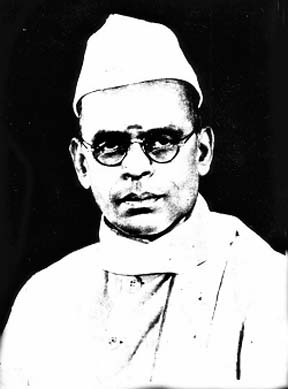
Sundara Sastri Satyamurti was an Indian independence activist and politician. He was acclaimed for his rhetoric and was one of the leading politicians of the Indian National Congress from the Madras Presidency, alongside S. Srinivasa Iyengar, C. Rajagopalachari and T. Prakasam. Satyamurti is regarded as the mentor of K. Kamaraj, Chief Minister of Madras State from 1954 to 1962.
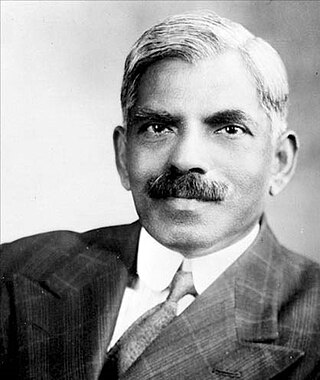
SirArcot Ramasamy Mudaliar was an Indian lawyer, diplomat, and statesman who was the first president of the United Nations Economic and Social Council and the 24th and last dewan of Mysore. He also served as a senior leader of the Justice Party and in various administrative and bureaucratic posts in pre- and Independent India.
Rao Bahadur Sir Annepu Parasuramdas PatroKCIE was an Indian politician, zamindar and education minister in the erstwhile Madras Presidency.
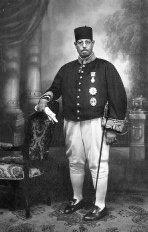
Khan Bahadur Sir Mohammad Usman was an Indian politician, hakim and socialite who served as the Minister of Home for the Madras Presidency in the Justice Party government of the Raja of Bobbili and as the first Indian acting Governor of Madras from 16 May 1934 to 16 August 1934. His name is often written Muhammad Usman.
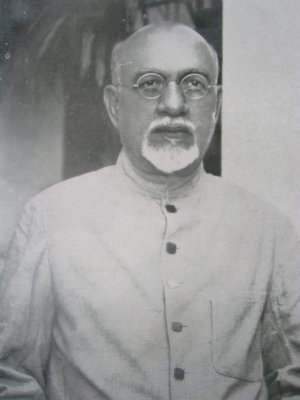
Maulana Yakub Hasan Sait or simply Yakub Hasan Sait (1875–1940) was an Indian businessman, freedom-fighter and politician who served as the Minister for Public Works in the Madras presidency from 1937 to 1939.

Bezawada Ramachandra ReddyCBE was an Indian politician of the Justice Party and one of the founders of the Swatantra Party. He served as the President of the Madras Legislative Council from 1930 to 1937. Ramachandra Reddy was a relative of Indian National Congress politician Bezawada Gopala Reddy.
Udupi Krishna Rau was a medical practitioner and politician of the Indian National Congress. He served as mayor of Madras city and as State minister.

The first legislative assembly election for the Madras Presidency was held in February 1937, as part of the nationwide provincial elections in British India. The Indian National Congress obtained a majority by winning 159 of 215 seats in the Legislative Assembly. This was the first electoral victory for the Congress in the presidency since elections were first conducted for Madras Legislative Council in 1920. The Justice Party which had ruled the presidency for most of the previous 17 years was voted out of power. The assembly was constituted in July 1937 and C. Rajagopalachari (Rajaji) became the first Congress Chief Minister of Madras.
The first legislative council election for the Madras Presidency after the establishment of a bicameral legislature by the Government of India Act of 1935 was held in February 1937. The Indian National Congress obtained a majority by winning 27 out of 46 seats in the Legislative Council for which the elections were held. This was the first electoral victory for the Congress in the presidency since elections were first conducted for the Council in 1920 and C. Rajagopalachari (Rajaji) became the Chief Minister. The Justice Party which had ruled the presidency for most of the previous 17 years was voted out of power. Congress also won the Legislative assembly election held simultaneously.
C. Rajagopalachari was a Chief Minister of erstwhile Madras Presidency and Madras State of Independent India. He was the first Indian National Congress member to assume office in Madras Presidency. He served as a Chief Minister for two terms spanning about five years. He was elected as a Chief Minister after 1937 elections in Madras Presidency and served till 1939. He was also the Chief Minister of Madras State after first elections held after Indian independence. His second term lasted from 1952 till 1954.
Diwan Bahadur Sir Mannath Krishnan NairKCIE (1870–1938) was an Indian politician from the Indian National Congress and later, Justice Party who served as a member of the Madras Legislative Council and later, executive council of the Governor of Madras. He also served as the Chief Justice of Travancore High Court and later Diwan of Travancore from 1914 to 1920(?)
Mariadas Ruthnaswamy CIE, KCSG (1885–1977) was a leading educationalist, statesman and a writer in Madras, India.
References
- 1 2 Manikumar, K. A. (2003). A Colonial Economy in the Great Depression, Madras (1929–1937). Orient Blackswan. p. 149. ISBN 978-81-250-2456-9.
- ↑ "Economic and Political Weekly". Sameeksha Trust. 1992: 1497.
{{cite journal}}: Cite journal requires|journal=(help)